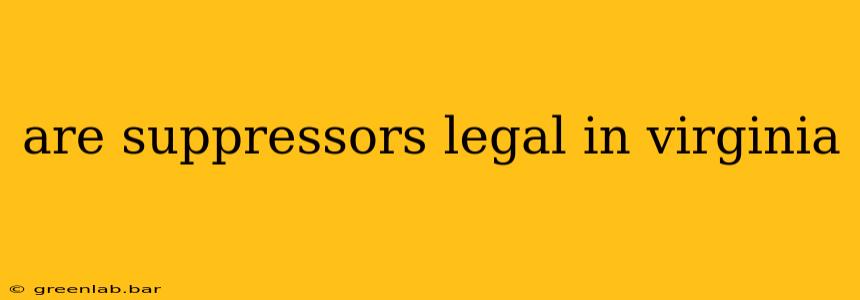The legality of firearm suppressors, often called silencers, in Virginia is a complex issue with nuances that require careful understanding. While the short answer is yes, suppressors are legal in Virginia, the process of owning one involves several legal hoops to jump through. This guide will break down the specifics, ensuring you're fully informed before considering purchasing a suppressor.
Virginia Suppressor Laws: Key Points
Virginia allows the possession and use of firearm suppressors, but only under specific conditions outlined in state and federal law. These conditions primarily revolve around registration, licensing, and compliance with existing firearm regulations.
Federal Regulations: The National Firearms Act (NFA)
The overarching federal law governing suppressors is the National Firearms Act (NFA) of 1934. This act mandates:
- Registration: All suppressors must be registered with the Bureau of Alcohol, Tobacco, Firearms and Explosives (ATF). This involves a thorough background check and a significant waiting period.
- Tax Stamp: A $200 tax stamp is required for each suppressor registered.
- Serial Number: Each suppressor must have a unique serial number.
Failure to comply with the NFA results in serious federal penalties.
Virginia State Regulations
Virginia's state laws largely align with the federal NFA, meaning there aren't additional restrictions beyond those imposed at the federal level. However, it's crucial to note that:
- State Laws Can Change: Firearm laws, including those concerning suppressors, are subject to change. Always refer to the most up-to-date information from the Virginia State Police or other reliable legal sources.
- Local Ordinances: Some localities in Virginia may have additional restrictions on firearm ownership or use, including suppressors. It's essential to check your local ordinances before purchasing a suppressor.
The Process of Legally Obtaining a Suppressor in Virginia
The process can seem daunting, but following these steps will ensure compliance:
- ATF Form 4: You'll need to complete ATF Form 4, the application for tax payment and registration of a firearm. This form requires detailed personal information and fingerprints.
- Background Check: A thorough background check will be conducted by the ATF. This is a critical step and any disqualifying factors will prevent approval.
- Waiting Period: Expect a significant waiting period, which can range from several months to over a year, depending on current ATF processing times.
- Tax Payment: The $200 tax stamp must be paid as part of the application process.
- Dealer Involvement: A licensed firearms dealer will handle the transfer of the suppressor, acting as an intermediary between you and the ATF.
Common Misconceptions about Suppressors
- Complete Silence: Suppressors significantly reduce the sound of a firearm, but they do not make it completely silent.
- Illegal Use: The use of a suppressor in the commission of a crime is illegal, regardless of its legal ownership.
Conclusion: Responsible Suppressor Ownership in Virginia
Suppressors are legal in Virginia, but only with strict adherence to both federal and state regulations. The process of acquiring a suppressor is rigorous, requiring patience, careful attention to detail, and compliance with all applicable laws. Always consult with legal professionals and relevant authorities to ensure you're fully informed and compliant before purchasing or using a suppressor. Understanding these regulations is crucial for responsible firearm ownership in Virginia.

